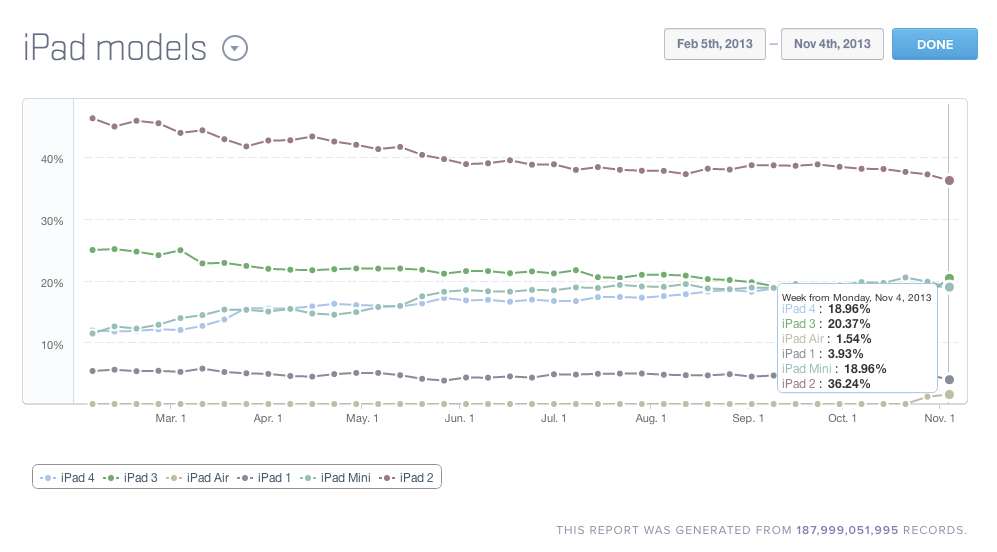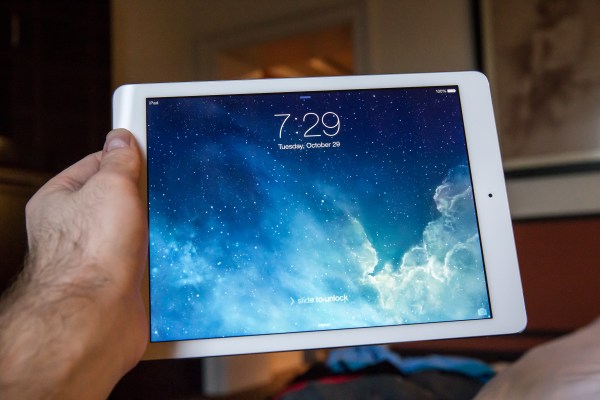Apple may indeed have attracted a much broader audience of upgraders for its redesigned 9.7-inch iPad versus last year, according to new early data from mobile app analytics firms. The iPad Air enjoyed somewhere around five times the first weekend adoption of the fourth generation iPad, according to Fiksu, and just under four times that of the iPad mini, which went on sale at the same time as the iPad 4.
 Fiksu found that three days after the iPad Air went on sale, it was being used by 0.88 percent of those millions using the apps of its clients – which is much better than either the 0.15 percent who were on iPad 4 three days after its launch, or the 0.22 percent who were on iPad mini at the same time. The iPad Air has attracted more early adopters than both devices combined, in fact, which, if borne out by device sales numbers, will mean a big win for Apple going into this holiday.
Fiksu found that three days after the iPad Air went on sale, it was being used by 0.88 percent of those millions using the apps of its clients – which is much better than either the 0.15 percent who were on iPad 4 three days after its launch, or the 0.22 percent who were on iPad mini at the same time. The iPad Air has attracted more early adopters than both devices combined, in fact, which, if borne out by device sales numbers, will mean a big win for Apple going into this holiday.
Backing up Fiksu’s tail of spiking early adoption are numbers from Mixpanel, which reports that the iPad Air is responsible for 1.54 percent of all iPad traffic to its clients’ applications as of this Monday. The iPad 2 and iPad 1 seem to have suffered the biggest concurrent drops in usage percentage, indicating possibly that Apple has managed to draw in a group of upgraders who were long-time holdouts on older devices with the iPad Air.
 Last year, during its launch weekend of both the iPad 4 and the iPad mini, Apple sold a total of 3 million new tablets. This year, if these adoption comparisons are correct, that number should be quite a bit higher, though there’s not always a direct relationship between usage and sales. Apple traditionally issues a release after the opening weekend of a new device to say how many it managed to sell, but with the recent iPhone launch, it waited until both the iPhone 5c and the iPhone 5s were launched before revealing numbers, since it rarely breaks out device sales by individual model.
Last year, during its launch weekend of both the iPad 4 and the iPad mini, Apple sold a total of 3 million new tablets. This year, if these adoption comparisons are correct, that number should be quite a bit higher, though there’s not always a direct relationship between usage and sales. Apple traditionally issues a release after the opening weekend of a new device to say how many it managed to sell, but with the recent iPhone launch, it waited until both the iPhone 5c and the iPhone 5s were launched before revealing numbers, since it rarely breaks out device sales by individual model.
The iPad is a slightly different story, since Apple hasn’t revealed a firm launch date for the iPad mini with Retina display yet, and since these numbers indicate it may be beneficial for it to reveal Air sales independent of the Retina mini, since both appear to be generating strong consumer demand. Either way, we’ll be sure to let you know what, if anything, Apple reveals about unit sales this time around.
Apple may have found the perfect balance with this iPad launch; a lighter, slimmer iPad Air that appeals to those who are fans of the bigger screen but who haven’t seen a real need to upgrade from first- and second-generation devices, and an iPad mini with a screen that could convince many first-gen device owners to upgrade, too. And staggering the release dates may have worked to their benefit, too – there’s less of a dilemma when one’s available on the other isn’t, and some who opted for iPad Air might later give in and find themselves buying a second device, depending on the reviews and reception of the smaller tablet.
